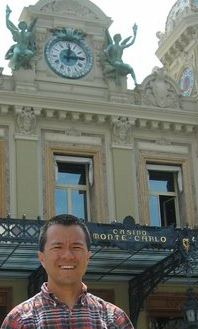Math 577 -- Monte Carlo Methods
Spring 2022

|
Instructor:
Kevin
Lin
Time: TTh 1100-1215
Office: Math 606
Course web page (this page):
|
Announcements
* <2022-01-12 Wed> Zoom I plan to stream + record the first couple weeks of classes (and perhaps more), in case anyone needs to (or would just like to) attend remotely. Stay tuned for updates. * <2022-01-12 Wed> Room change Due to capcity issues, we will meet in Math 402 for the rest of the semester.
This introductory course is aimed at graduate students in mathematics,
statistics, computer science, engineering, physical sciences,
quantitative biology, or really any field where Monte Carlo methods are
used. The goal is to equip students with knowledge of basic algorithms
and relevant theory so they can design and implement Monte Carlo
solutions to scientific problems and perform basic statistical analysis
on the output. As such, the course tries to balance between discussion
of practical algorithms and their mathematical analysis.
The first part of the course will cover
Interested students unsure about their background are encouraged to see
the instructor prior to registering for the course.
The grade breakdown is as follows:
The following standard textbooks on Monte Carlo are intended as primary
references. Of these, [O] is perhaps closest in spirit and level to
this course.
For sequential Monte Carlo, particle filtering, etc., see
Syllabus
* <2022-01-13 Thu> Introduction
Course description
Monte Carlo methods are numerical algorithms that use random sampling to
generate statistical estimates of (usually) deterministic quantities.
They are often more efficient than their deterministic counterparts,
especially for higher-dimensional problems, and are widely used in
scientific, engineering, and statistical computing.
Examples will be drawn from physics, chemistry, Bayesian statistics, and
other fields, depending in part on student interest. However, no
background in these areas is assumed. The second part covers more
specialized topics. Potential topics may include (but are not limited
to)
A detailed week by week plan will be posted on this page, and updated as
we go along.Prerequisites
Students should know probability at the advanced undergraduate level,
e.g., MATH 464 or equivalent, as well as linear algebra (e.g., MATH 410
or equivalent). I plan to briefly review some of this, and cover any
additional material (e.g., Markov chains) as needed. Students are
expected to carry out both pencil-and-paper analysis and computer
experiments.Grading
Grading will be based on a small number of problem sets and an
individual term project. Students will consult the instructor to choose
a suitable project topic; projects related to students' own research are
especially encouraged. Project results will be presented to the class
and summarized in a term paper, to be published on the course web
page after the end of semester. Because term papers will be published,
you should be careful not to include new work that you plan to publish
later.
There are no exams in this course.References
There is no required text, and I do not plan to follow any particular
text closely. I do plan to assign reading from some of the books and
lecture notes listed below, in addition to course notes and papers to be
posted later in the term. All these are either downloadable for free
from the UA Library (just follow the links below from a computer on the
campus network, or use VPN), or available from the authors.
Additional general references:
In addition to the books above, there are two sets of lecture notes you
may find useful:
[M] provides a very readable introduction to some of the things we'll
cover, and [S] gives a clear, concise exposition of some key ideas in
Markov chain Monte Carlo.
For EnKF, see
Finally, for Markov chain theory:
This page was last updated on January 21, 2022.